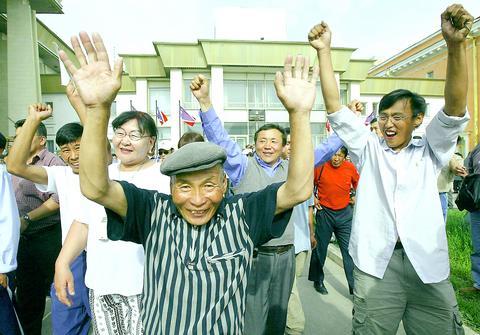Mongolia's opposition democrats claimed what would be a stunning victory yesterday in parliamentary elections disputed by Prime Min-ister Nambaryn Enkhbayar who accused his rivals of widespread vote-rigging.
The prime minister's Mongolian People's Revolutionary Party (MPRP) and Motherland Democratic Coalition (MDC) each won 36 seats in the Great Hural, or parliament, election committee officials said citing the first official preliminary result.

PHOTO: AFP
If officially confirmed by the election committee, the result would be a dramatic reversal for the MPRP, which had 72 seats in the 76-seat parliament before Sunday's polls and had been confident of an overwhelming victory.
The democratic coalition claimed victory by including three seats among their independent allies, which would mark a comeback for the democrats who were swept from power by the MPRP four years ago.
"The preliminary result is that the MPRP has 36 seats, the MDC has 36 seats, independents have three seats and the Mongolian Republican Party has one seat," said committee chairman Yadamsuren.
He said an official announcement was likely today after the commission verified results phoned in from 12 far-flung constituencies in a country where half the 2.7 million people are nomads and many voters travelled to polls by horseback or camel.
The MPRP, which ruled Mongolia for much of the 20th century as a one-party Soviet satellite, had been widely expected to skate to an easy victory after four years of economic stability in the impoverished country.
Now, Enkhbayar faces being ousted, though not without a fight.
"He [Enkhbayar] said there was a certain amount of irregularities in certain constituencies," said Tjalling Halbertsma, an adviser to the party chairman, citing the movement of people to vote outside their constituencies.

AIR SUPPORT: The Ministry of National Defense thanked the US for the delivery, adding that it was an indicator of the White House’s commitment to the Taiwan Relations Act Deputy Minister of National Defense Po Horng-huei (柏鴻輝) and Representative to the US Alexander Yui on Friday attended a delivery ceremony for the first of Taiwan’s long-awaited 66 F-16C/D Block 70 jets at a Lockheed Martin Corp factory in Greenville, South Carolina. “We are so proud to be the global home of the F-16 and to support Taiwan’s air defense capabilities,” US Representative William Timmons wrote on X, alongside a photograph of Taiwanese and US officials at the event. The F-16C/D Block 70 jets Taiwan ordered have the same capabilities as aircraft that had been upgraded to F-16Vs. The batch of Lockheed Martin

GRIDLOCK: The National Fire Agency’s Special Search and Rescue team is on standby to travel to the countries to help out with the rescue effort A powerful earthquake rocked Myanmar and neighboring Thailand yesterday, killing at least three people in Bangkok and burying dozens when a high-rise building under construction collapsed. Footage shared on social media from Myanmar’s second-largest city showed widespread destruction, raising fears that many were trapped under the rubble or killed. The magnitude 7.7 earthquake, with an epicenter near Mandalay in Myanmar, struck at midday and was followed by a strong magnitude 6.4 aftershock. The extent of death, injury and destruction — especially in Myanmar, which is embroiled in a civil war and where information is tightly controlled at the best of times —

China's military today said it began joint army, navy and rocket force exercises around Taiwan to "serve as a stern warning and powerful deterrent against Taiwanese independence," calling President William Lai (賴清德) a "parasite." The exercises come after Lai called Beijing a "foreign hostile force" last month. More than 10 Chinese military ships approached close to Taiwan's 24 nautical mile (44.4km) contiguous zone this morning and Taiwan sent its own warships to respond, two senior Taiwanese officials said. Taiwan has not yet detected any live fire by the Chinese military so far, one of the officials said. The drills took place after US Secretary

THUGGISH BEHAVIOR: Encouraging people to report independence supporters is another intimidation tactic that threatens cross-strait peace, the state department said China setting up an online system for reporting “Taiwanese independence” advocates is an “irresponsible and reprehensible” act, a US government spokesperson said on Friday. “China’s call for private individuals to report on alleged ‘persecution or suppression’ by supposed ‘Taiwan independence henchmen and accomplices’ is irresponsible and reprehensible,” an unnamed US Department of State spokesperson told the Central News Agency in an e-mail. The move is part of Beijing’s “intimidation campaign” against Taiwan and its supporters, and is “threatening free speech around the world, destabilizing the Indo-Pacific region, and deliberately eroding the cross-strait status quo,” the spokesperson said. The Chinese Communist Party’s “threats